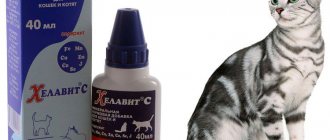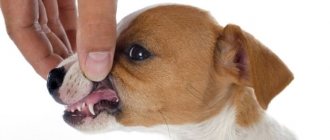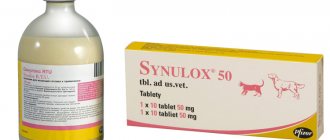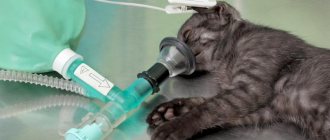- October 19, 2018
- Dogs and hunting with them
- Kira Ifeevskaya
How to worm a puppy for the first time? How often should deworming be carried out and why? What drugs should be used for these purposes? These questions interest many novice dog breeders.
Note that deworming is a therapeutic and preventive measure that is aimed at preventing the appearance of parasites. This procedure is part of the necessary care for your pet.
Age for first worm prevention. How many times a year is it held?
When to worm a puppy for the first time? It is best to do this from three weeks of age. It is worth using for these purposes products that are marked: “For kittens”, “For puppies”. Other similar drugs are designed for dogs and other older animals. Typically, these drugs are already used after the animal reaches one and a half months of age. How often to worm a puppy? The deworming procedure should be carried out once a quarter. This rule applies to both puppies and adult dogs.
Deworming of bitches
Veterinarians receive many questions about whether it is possible to worm a dog during heat and whether it is possible to worm a pregnant dog. There are no contraindications to deworming female dogs during estrus. They undergo the procedure in the same way as male dogs of their age and weight.
Bitches reach maturity between 6 and 12 months of age, and later in some large breeds. Pregnancy is possible after the first heat, but it is recommended to allow the dog to be bred only after the third cycle. The onset of this period is confirmed by the doctor using palpation, tests and ultrasound.
Vaccinations should be carried out before pregnancy, as this ensures a high level of antibodies, which the dog will pass on to its puppies during lactation. For deworming, you need to use a drug that is suitable for pregnant bitches. Such a remedy is Fenbendazole, which is effective against roundworms, hookworms, tapeworms and tapeworms. Combinations of Pyrantel and Praziquantel can also be given.
The dosage regimen depends on the chosen product; you must carefully follow the instructions, and it is better to consult a veterinarian if in doubt. Deworming during pregnancy will help prevent the transmission of worm infection to puppies, and it should be carried out in accordance with the doctor’s recommendations.
When do you need to deworm animals, particularly puppies?
We already know the answer to the question, is it possible to worm a puppy? Of course, this can and should be done. But all activities should be carried out carefully, perhaps even in consultation with a veterinarian. You should be especially careful with animals that eat raw meat and fish.
Deworming is carried out due to the fact that such individuals have an increased risk of developing parasites, since raw meat can be infested with their cysts. How to worm puppies? As a rule, the drug is given to animals once. But, if there is a suspicion of the presence of parasites (a bloated tummy, detection of adult worms in the feces, etc.), then after two weeks you need to re-give the remedy to the puppy. The dose should be the same.
Why do this? Repeated deworming is carried out due to the fact that the drug acts only on adult parasites, but not on their eggs. Namely, it is from the latter (if they are present, of course) that worms grow in ten days. Therefore, repeated administration of the drug is necessary.
How to deworm before vaccination or vaccination
There are only a few basic tips.
Since worms enter the pet’s body with fleas, it is better to get rid of them first and then deworm them. Otherwise, there is a considerable chance that the parasites will return.
- The drug should be given on an empty stomach, at least 30 minutes before meals - this way it is better absorbed. But sometimes it is acceptable to give it along with a small portion of food.
- Before taking an antiparasitic drug, it is advisable to take an immunostimulant, and an hour and a half after - any absorbent.
- If the dog does not have a bowel movement within 6 hours after taking the drug, it should be given a laxative.
- To prevent dehydration, the animal should be given access to clean water.
- If the drug provokes diarrhea, this may indicate intoxication of the body. Veterinarian intervention is required.
At what point should medications be given?
The fact is that the first comprehensive vaccination (DHLPPi) is usually done at 2 months, and the rabies vaccination is given at least 180 days of age. At the same moment, it is time for the second vaccination. And the third is recommended after changing teeth. And these are just the main examples. In this regard, the question arises: will the animal have to be dewormed too often?
How many days before vaccination or vaccination?
Some advise doing the procedure 7-10 days before vaccination, while others recommend 2 weeks. This difference of opinion should not scare you, because veterinarians can evaluate each animal individually. To clarify this point, contact a specialist 15 days in advance. Let him tell you how many days before vaccination or vaccination you should do anthelmintic.
How many times (how often)
There are different views here too. Veterinarians agree that it is better not to expose the dog to stress again, since such a procedure is associated with toxic substances. The puppy is first wormed 3 weeks after birth or later. Then - once every 3 months or six months . The optimal frequency of the process may be influenced by the dog's diet.
For example, dry food is not as dangerous as raw meat. Accordingly, if you limit yourself to high-quality artificial nutrition, an adult dog will need to be dewormed approximately once a year. If the animal lives on the street, the risk of helminths entering the body increases and the optimal treatment interval for it is 4 months .
So, if you are planning multiple vaccinations over a 12 month period, ensure that the frequency of deworming does not exceed 2-4 times per year .
What are the remedies?
We have already figured out how to deworm a puppy. Now let's look at what medications there are. In such products, the main active ingredient either destroys adult parasitic worms or interferes with their vital functions.
If we talk about how effective this or that product is, then we can say that almost all of them work the same way. Note that some drugs can be aimed at destroying a certain type of parasites, and if they are detected in an animal, the veterinarian prescribes the appropriate anthelmintic.
When are puppies wormed for the first time and with what? As we found out, this is done no earlier than three weeks. When choosing a drug for preventive deworming, pay attention to products that are suitable for your pet in terms of age and weight. Also pay attention to the type of drug. The dosage should be calculated very carefully. How to do this?
For example, many anti-worm medications in tablet form are designed for ten kilograms of weight. This is very convenient if his body weight is twenty kilograms. But what to do if the pet is small, weighing 950 grams? For these purposes, it is most convenient to use suspensions for small breeds. Typically, the dosage of these drugs is as follows - 1 ml of product per 1 kilogram of weight.
You can also use drops on the withers. They are produced for animals with different body weights. They are quite simple and convenient to use. The only important thing is that the pet does not lick the drug, otherwise it may be poisoned.
When choosing a product, remember that they are available in different dosage forms. If you have any doubts, consult your veterinarian.
Is it possible to administer the vaccine yourself at home? Is it worth it?
This option is acceptable. It happens that there is no specialist nearby, and the clinic is very far away. Sometimes people just want to save money - the difference will be significant. In this case, you need to have the skills to administer injections to animals. Know how to handle the drug, store and transport it correctly.
If the vaccine is not stored at 4-8 degrees, it will die. It is important to prepare the animal yourself, as described above. Follow the instructions in the instructions for the drug (age, date of revaccination). Be sure to decontaminate the syringe and containers by burning or boiling for 15 minutes.
Important! Such a vaccination will not be confirmed by the regulatory authority!
Even self-glued labels from bottles of the drug will not give you permission to move or take other actions that require vaccination of your pet.
In this case, revaccination is carried out, but in an official institution. This is especially true for rabies vaccination.
"Drontal." Description and reviews
We have already told you when to worm puppies, then we will look at different drugs. Knowing this information, you can independently choose the appropriate product.
"Drontal" is a drug that has a broad anthelmintic effect. Available in the form of tablets, which are designed for 10 and 35 kilograms.
Dog breeders consider this drug to be quite effective, but expensive. Some owners had problems with the product and their pets experienced side effects. There is an opinion that there are now many counterfeits of this drug on the market, which is why many dog breeders have switched to other products.
Prevention for large and small breeds
In terms of the frequency of preventive measures, there is no difference between large and small breeds. There are differences in the drugs used. For small and problem (allergic) breeds, the anthelmintic, dosage and frequency of cleaning procedures should be prescribed by a veterinarian. Usually these are milder drugs, like those for puppies.
If for large breeds tablets are preferable, since they have a more pronounced effect and speed of action, then for small breeds the bulk is made up of suspensions.
"Stronghold" and "Lawyer". Description and reviews
A drug such as Stronghold has a wide spectrum of action. The product inhibits the development of worm eggs and kills adult worms.
The basis of the drug is selemectin. "Stronghold" is an effective, but not particularly toxic drug. The product is applied to the withers and acts not only on worms, but also on ticks and fleas. The dosage of this drug is as follows:
- For large animals – 45 mg.
- For puppies up to one and a half months – 15 mg.
- For dogs up to five kilograms – 30 mg.
“Advocate” - drops that have an active effect on internal (roundworms, tapeworms) and external parasites. How much medication should be applied to the withers depends on the size and weight of the animal. These drops are used both for prevention on a monthly basis and once for treatment. The product effectively fights parasites. “Advocate” does not work on ixodid ticks.
People who have used these drops say that they are quite effective. As dog owners note, when used correctly, there are usually no side effects.
"Helminthal". Description of the drug and reviews
The drug is available in the form of a suspension. It has a wide spectrum of action against round and tape helminths in all phases of development.
The drug is used from three weeks of age for prophylactic as well as therapeutic purposes. The product is used for nematodes and cestodes, as well as mixed infestations. The dosage of the drug is 1 ml per 4 kg. Gelmintal should be given once with food.
Many dog owners speak positively about the product. They say no side effects have been identified.
"Prasicide." Description and reviews
The suspension is used for therapeutic and prophylactic purposes against cestodiasis and nematodiasis for puppies from two weeks of age.
The drug should be given once during morning feeding with food or on the root of the tongue. The drug must be administered using a syringe without playing. The dosage of the product is 1 ml per 1 kg of puppy’s body weight. Before use, shake the bottle for 30 seconds. A starvation diet and the use of laxatives are not required.
Many people who have used the drug say that it is effective. In addition, it is quite easy to give to the animal. Unfortunately, some puppies experienced side effects - depression, drooling, etc.
How to properly give anthelmintic to a dog
Deworming before vaccination is carried out 10–14 days before vaccination. If this procedure is performed for the first time for a puppy, it is better to consult a veterinarian, since only a professional can accurately recommend tablets and calculate the required dosage. If the drug or dosage is chosen incorrectly, the puppy may experience complications.
- 40 minutes after administering the medicine, you can give the puppy Vaseline oil to drink for better absorption of the anthelmintic; take 3 ml of oil per 1 kg of animal weight. Vaseline oil improves the effect of the anthelmintic drug, protects the puppy’s intestines from dysbacteriosis and complete intoxication.
- If a puppy has traces of worms in his feces, then the infection has already gone far, and it is unknown how many of them are in the body. It is necessary to take tests to identify the type of helminths, on the basis of which treatment will be prescribed.
- If an animal cannot drink medicine on an empty stomach, then anthelmintics can be given 3 hours before meals or 2 hours after feeding.
- To make deworming more comfortable, before and after it, the dog should be given medications that support the liver and kidneys. It is these organs that bear the brunt of the toxins caused by dying helminths. Only a veterinarian can tell you what type of product to give to an animal, but most often they use hepaprotectors, for example, Karsil; you can give sorbents, for example, Enterosgel.
- If it is known that the animal is infected with helminths, and their traces are noticeable in the feces, then before the vaccine is administered, the dog must be dewormed twice, maintaining an interval of 14 days. It is important to vaccinate every 10 days.
The vaccination should not be given to an organism weakened by helminths, since the administration of the vaccine is stressful for the animal, and it is not known how the drug will affect the pet’s condition.
"Milprazone." Description and reviews
This combination drug is intended for puppies and dogs weighing from 500 grams to 5 kg. Active ingredients: milbemycin oxime and praziquantel.
The drug has proven itself to be an effective remedy. Those who have used it say that Milprazone really helps fight internal parasites. In addition, no side effects are observed when used even in small puppies.
How to tell if your dog has parasites
The following symptoms will help you understand that your pet has worms:
- The dog rides on its tail, so it tries to fight the itching in the anus.
- Hiccups that appear after eating.
- The puppy cannot calmly swallow food; it seems to get stuck in the throat.
- Skin and allergic manifestations.
- Appetite disturbances, sometimes absence, sometimes on the contrary increase, with external weight loss of the animal.
- Poor bowel movements in dogs can result in both diarrhea and constipation.
- Vomiting, sometimes with the release of parasites.
- Apathy, weakness, deterioration.
- Isolation of parts of helminths along with feces.
- A swollen abdomen with simultaneously protruding ribs.
- The appearance of rickets and a lag in growth and development from their peers.
If your dog has diarrhea after taking an anthelmintic, you should contact your veterinarian, because this may be a sign of intoxication. In this case, you cannot carry out treatment yourself, otherwise you can only worsen the situation.
"Polyvercan". Description and reviews
This product is intended for puppies and dogs. Available in the form of sugar cubes. The drug is aimed at destroying round and flat helminths.
The cubes can be dissolved in a small amount of drinking water. 1 cube is designed for 10 kg of animal body weight. Can be used from two weeks of age.
Reviews about this product are quite varied. Has anyone experienced side effects from this drug? For others, the process went quite well, without any problems.
Safety regulations
We have already found out when to worm a puppy for the first time. But when carrying out the deworming procedure, it is worth remembering the following safety rules:
- You should not give deworming medications to exhausted, weak, recently operated or sick animals. In such cases, the animals’ bodies are already weakened. And the toxic effects of drugs can lead to bad consequences.
- When giving your dog an anthelmintic, strictly follow the dosage, frequency and regimen.
Should puppies be bred before they are one year old?
Puppies are allowed to take anthelmintic drugs from 3-5 weeks of age. Worming periods for puppies:
- It is necessary to carry out the first procedure of cleansing the body before vaccination. If the puppy was taken from home breeding or a kennel, most likely the mother was wormed before mating, and a single procedure is enough for such a puppy.
- If the puppy is removed from the street environment, or it has obvious signs of helminthic infestation, you will need to consult a veterinarian and possibly re-treat it. Only after this can he be vaccinated.
How many times can you poison?
Puppies are at risk; they are more susceptible to infection, so up to a year of age, prevention should be carried out every 3 months.
Deworming the animal before vaccination. Why do veterinarians insist on this procedure?
We have already found out at what age puppies are wormed. Now let's talk about why deworming is necessary.
Remember that vaccinating an animal is the most important measure in establishing a pet’s immunity to dangerous diseases. During the vaccination process, weakened viruses are introduced into the animal's body. This is necessary in order for him to develop immunity to these very diseases. If background parasitosis intervenes at this stage, then immunity may not be formed or will be unstable and weak. As a result, the vaccine simply won’t work at the wrong time.
Condition after cleaning: normal and deviations
After deworming, it is important to monitor the dog’s condition in order to notice possible deviations in time. Taking the medicine leads to the death of parasites that release toxic substances into the animal’s body; tablets are also not very useful. Suspicious signs after the procedure include the following:
- problems with coordination and gait;
- convulsive manifestations;
- dilated pupils;
- increased salivation;
- vomiting, severe diarrhea;
- pale or bluish mucous membranes;
- lack of appetite, refusal of water;
- inability to go to the toilet.
If such symptoms occur, it is necessary to provoke vomiting in the dog, and then give the dog an adsorbent to drink. If your pet's condition does not improve, you should immediately consult a doctor.
What happens if you neglect worming?
If preventive treatment is not carried out, the parasites will constantly multiply and release toxic substances into the animal’s body. The waste products of worms provoke inflammatory processes in the internal organs and systems of the pet. The dog becomes more susceptible to various infections and diseases, and the immune system weakens.
You can put the medicine in treats and give it to your dog.
Attention! Worms are transmitted from dogs to humans, so not only the pet is at risk, but also the people around it.











